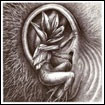 BOTANIST III: Doom In Bloom 2 x LP (Favonian) 24.98
BOTANIST III: Doom In Bloom 2 x LP (Favonian) 24.98��� The third album from this unique San Francisco botanical metal outfit has been released on limited-edition vinyl for the first time, a double LP pressed on black vinyl and housed in gatefold packaging, limited to three hundred fifty copies. We also just restocked the original double CD release on TotalRust, which features an entire second disc of additional material from other bands featuring Botanist's Otrebor on drums.
��� There was never a moment where you could confuse Botanist with a typical black metal outfit. From the beginning, this San Francisco based one-man band crafted a wholly unique sound, taking signature elements of black metal and reshaping them using just drums and dulcimer into something new, a dissonant, ethereal sound shot through with shockingly pretty melodies that at times could remind me of old NY noise rock outfits like Band Of Susans more than anything "blackened". Main member Otrebor tied that unusual dulcimer-draped sound to an aggressive eco-consciousness, explored through a surreal fantasy world where plant life becomes the dominant life form, a concept that has expanded over the course of each new album. The combination of all of this produces one of the weirdest (and coolest) things to come out of the fringes of the US black metal underground.
��� On Botanist's third album Doom In Bloom, Otrebor again shifted his approach, moving into even more melodically-rich directions from the previous releases. The seven songs come across more like some blackened, funereal post-rock, the music much slower than before, with a mournful atmosphere descending across all of these long sprawling songs. His drumming takes on a more deliberate, stately feel, with expressive percussive touches underscoring the wistful tone of the dulcimer's steel-strung melodies; there's a strong contrast with the more frenzied, pell-mell pacing of his earlier albums. Some of the songs on Bloom stretch out for twelve minutes or more, dark mournful arrangements of emotional melody shifting into waves of rumbling double-bass and chant like singing, opening up into passages of hushed piano and aching instrumental beauty. As always, the distinctive clang of the dulcimer brings an unusual folky feel, but the riffs are more muted, the "doom" aspect suggested at in the album's title materializing through the creeping dread of tracks like "Deathcap". There's a funerary vibe as well, turning some of this stuff into intensely melancholy, folk-flecked drone rock, and elsewhere the sound swells into a strange combination of neo-folk pomp and dark post-rock grandeur. What little residue of black metal remains is mainly heard in the vocals, a weird wheezy croak buried down in the mix, sometimes exploding into monstrous screeching, or reduced to a nervous, tremulous whisper; it's all an abrasive counterpoint to the gorgeous, shadow-stained darkness of the music. Fantastic stuff.
Sample :

